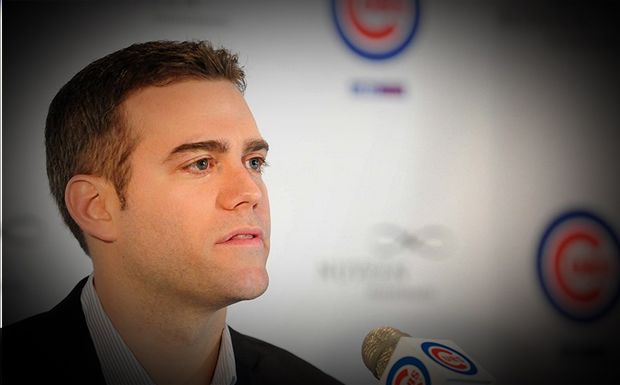
After two World Series titles raised the expectations of the Boston Red Sox and their wunderkind GM Theo Epstein, the Red Sox Way, as it’s sometimes called, abandoned its steady approach to organizational depth in favor of win-now, Yankees-style spending.
Those win-now contracts currently reside on the L.A. Dodgers’ ledger. Similarly, Epstein now resides in Chicago.
The free agent binge contracts handed to the likes of Carl Crawford and Adrian Gonzalez were largely responsible for pushing Epstein out of Boston. Those deals cost the Red Sox hundreds of millions in salary commitments but provided little in the way of wins. The big contracts were a stark departure from Epstein’s careful approach to building bottom-to-top organizational viability. However, they weren’t to be unexpected. Those kinds of deals are symptomatic of a club that must continue winning in the present—not one aimed at sustaining success in future seasons.
Only after the team claimed its first title in eight decades in 2004 did the approach become one of multi-year, multi-million dollar contract extensions and free agent acquisitions. When the Sox opened their wallets to holding an upper-echelon payroll, the farm system was still there to support the star contracts. That depth helped to bring a second title in 2007.
Maintaining a title-track roster year after year is nearly impossible to do by simply shilling for the most expensive free agents on the market, as the Red Sox discovered in the last few years. As a result, the contracts of Crawford, Gonzalez and Josh Beckett were moved to Los Angeles, and the team is in the process of rebuilding.
Much like the Chicago Cubs.
Boston stole the headlines last season with the LA trade, but Chicago was undergoing its own tear-down and rebuild process, albeit to much less fanfare. Geovany Soto, Ryan Dempster and Jeff Baker were moved. Alfonso Soriano and Matt Garza remain potential trade targets. The team has spent its offseason making a number of small name, small salary acquisitions from the waiver wire and in free agency. Only Edwin Jackson, who signed a four-year, $52 million dollar contract with the Cubs in December, counts as a big-money acquisition for Epstein’s Cubs.
To their credit, the Cubs’ top execs have been increasingly transparent — from pursuing discount free agents in the offseason to the roster-churn of big-leaguers for prospects at the trade deadline to the willingness to finish among the worst if they can’t finish first to assure higher draft picks.
“We’re not trying to hide the ball,” Epstein said in the final days of the season. “We’re trying to be honest with [the fans]. There might be some tough things we have to tell them along the way.”
The rebuilding process is a slow one, and for a big market team like the Cubs, whose ownership group has said it won’t be withholding funds from baseball operations, the go-slow approach to rebuilding the organization may not be a palatable one.
Chicago has spent richly on free agents in recent years. The Cubs have a strong season-ticket base and a healthy television contract with WGN, which is set to expire soon and could be worth billions in its next iteration. Fans expect the team to retool with Yankees-style spending on established stars. Paring down the roster in the way one expects the Pirates or Royals to hit restart on their franchise philosophy is not something Cubs fans have seen in some time.
However, is it really worth it to overpay for free agents in an effort to rebuild? Consider 2012’s playoff clubs. The Angels, Dodgers and Red Sox, who spent their 2012 seasons spending richly on names like Gonzalez, Albert Pujols and Gonzalez (again) all missed the playoffs. By comparison, playoff qualifiers such as Washington, Baltimore, St. Louis and San Francisco were able to reach the second season without spending in the same stratosphere as the Yankees, Rangers and LA teams.
The Dodgers acquired some $200-plus million in contract obligations from the Red Sox alone, yet were still unable to reach the postseason. Even after adding Zack Greinke to their rotation this winter, the team will still begin as a likely underdog to their division rivals in San Francisco.
The Red Sox’ fall from grace and the Dodgers’ inability to win with Boston’s castaways should serve as a cautionary tale in big spending and the win-now mentality. Chicago is not just a few big pieces away from contending in the NL Central. Rather, they’re only a few expensive mistakes away from hamstringing their payroll and their franchise even deeper into the future.
If the Rays, A’s and early-2000’s Red Sox provide any model to be followed, it’s that a winning team can be had by spending intelligently in all areas besides free agency. Only after those core concerns have been addressed can a free agent splash deal help to put an already good team into the championship echelon.
The Cubs are a few years and a number of smart moves away from being that championship-bubble franchise. The work Epstein is doing now, even if frugal and frustratingly slow on the surface, is more likely to provide sustained winning than by repeating the mistakes that exiled him from Boston in the first place.
